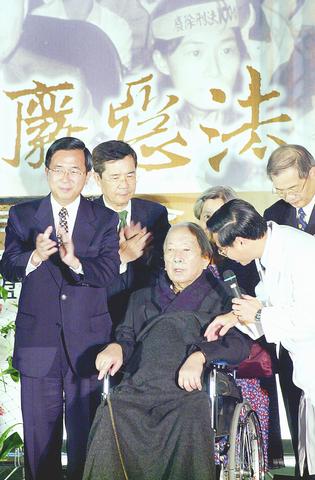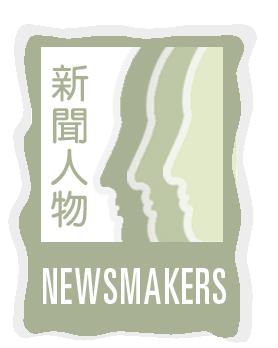On Thursday, Lee Chen-yuan (李鎮源), an internationally recognized expert on snake venom research and a fanatical advocate of Taiwan independence, passed away at the National Taiwan University Hospital at the advanced age of 86.
It is the same hospital where he was educated and trained to be a toxicologist.
Lee, who had suffered asthma and myelo dysplaisia, had been hospitalized since May for pneumonia. On Oct. 29 he fell into critical condition after respiratory failure and he eventually died of multiple organ failure on Thursday.

PHOTO: GEORGE TSORNG, TAIPEI TIMES
The presidential office, the Academia Sinica and the Taiwan Independence Party (TAIP) have announced that they will jointly organize the funeral for Lee in order to recognize his outstanding contributions to the country.
"His idealistic persistence is a model for us to follow," said Wu Shuh-min (吳樹民), a presidential advisor and the chief executive of the Foundation of Taiwan Medical Professionals Alliance (台灣醫界聯盟, FTMPA) during Lee's presidency, "nowadays, we rarely see such consistency in a person in the pursuit of his ideals."
"I am touched by the efforts he made toward the goal of Taiwan's independence and its inclusion in international organizations like the UN and the WHO," Wu said after being informed of Lee's death.

Wu divides Lee's life-long passion for Taiwan into two phases -- first his academic achievements, followed by his devotion to Taiwan's political reform.
"His advanced studies on snake venom are so well-known that I don't have to talk about it again. But his decision to leave his lab to pursue politics has boosted the idea of Taiwanese intellectuals caring for their society," Wu told the Taipei Times.
In Taiwan the study of snake venom is the only basic scientific research being done for medical purposes. The nation's achievements in this regard has a good reputation internationally and Lee, undoubtedly, was the driving force behind Taiwan's successes in this field.
When Lee graduated from Taipei Imperial University's Faculty of Medicine during the time of Japanese rule, he was approached by several Japanese-taught professors who wanted him to be their assistant. But he decided to follow Dr. Tu Tsong-ming (杜聰明), the only indigenous Taiwanese professor at the university back then -- and the first Taiwanese to earn a medical doctorate, majoring in pharmacology.
His paper entitled Toxicological research into the venom of Russell's viper, was published in 1945 and won him international recognition as a specialist on neurotoxins. This paper -- the first study to reveal how the venom of Russell's viper causes death -- also earned him a doctorate from the medical school of National Taiwan University.
Lee devoted most of his laboratory study to isolating neurotoxins from the venom of two poisonous snakes -- Familly-Elapidae (cobra) and Bungarus-multicinitus (many-banded krait). He published more than 100 papers in prominent international scientific periodicals during his lifetime.
His pharmacological analysis on the neurotoxins was highly esteemed by academics for its great impact on the study of how acetylcholine functions in relation to its carrier animals.
He was not involved in any political activities before 1990, the year he decided to leave laboratory work. In March, he joined the so-called "March Student Demonstration" (三月學運), the biggest student movement ever in Taiwan, and quietly participated in the students' sit-in at the Chiang Kai-shek Memorial.
In 1991, Lee led the Action 100 Alliance (一百行動聯盟), whose aim was the abolition of Article 100 of the criminal code, the so-called law on "crime of internal disruption of the peace."
Partly because Lee's appeal was vigorously supported by Taiwanese intellectual circles and public opinion, the legislature finally passed an amendment of Article 100. This granted the Taiwanese freedom of thought and speech, as well as freedom of association.
In 1992, Lee founded the FTMPA to unite the medical community to play a more active role in curing the nation of its malais. He also led the medical group to push for Taiwan's entry into the UN and the WHO under the name of "Taiwan."
In 1995, when Hsu Shin-liang (許信良) -- widely regarded as a deal-making politician in terms of his ideas on cross-strait relations -- chaired the DPP, Lee formed the TAIP to counter Hsu's concept of "march westward boldly, open to three full links" (大膽西進,開放三通).
After the 2000 presidential election, when Chen Sui-bian (
Lee said he quit the party he established because its transitional mission had been fullfilled (with Chen's election victory).
"Thanks to Lee's efforts the establishment of the TAIP served successfully as a firewall against the DPP's possible China policies under the chairmanship of Hsu.
That is why the voice of Taiwanese independence is still heard by the international community," said William Huang (
"Each time when I saw him, at such an advanced age, fighting so hard for the dignity of Taiwan's people and Taiwanese independence, whether in the crowds or on the campaign podium, it made me feel that how can we younger generation be absent in this historical mission?" Huang told the Taipei Times.
"It's sad that his dream of Taiwanese independence wasn't realized during his lifetime, but his contribution should be remembered," commented Huang.
Even so, Huang -- and certainly also a number of other prominent TAIP members -- won't forget his abandonment of the party he helped to found.
"It's hard to forgive. Since the goal of Taiwan independence has not been reached yet, how could he abandon the party?" Huang said.

NEXT GENERATION: The four plants in the Central Taiwan Science Park, designated Fab 25, would consist of four 1.4-nanometer wafer manufacturing plants, TSMC said Taiwan Semiconductor Manufacturing Co (TSMC, 台積電) plans to begin construction of four new plants later this year, with the aim to officially launch production of 2-nanometer semiconductor wafers by late 2028, Central Taiwan Science Park Bureau director-general Hsu Maw-shin (許茂新) said. Hsu made the announcement at an event on Friday evening celebrating the Central Taiwan Science Park’s 22nd anniversary. The second phase of the park’s expansion would commence with the initial construction of water detention ponds and other structures aimed at soil and water conservation, Hsu said. TSMC has officially leased the land, with the Central Taiwan Science Park having handed over the

The Philippines is working behind the scenes to enhance its defensive cooperation with Taiwan, the Washington Post said in a report published on Monday. “It would be hiding from the obvious to say that Taiwan’s security will not affect us,” Philippine Secretary of National Defense Gilbert Teodoro Jr told the paper in an interview on Thursday last week. Although there has been no formal change to the Philippines’ diplomatic stance on recognizing Taiwan, Manila is increasingly concerned about Chinese encroachment in the South China Sea, the report said. The number of Chinese vessels in the seas around the Philippines, as well as Chinese

AUKUS: The Australian Ambassador to the US said his country is working with the Pentagon and he is confident that submarine issues will be resolved Australian Ambassador to the US Kevin Rudd on Friday said that if Taiwan were to fall to China’s occupation, it would unleash China’s military capacities and capabilities more broadly. He also said his country is working with the Pentagon on the US Department of Defense’s review of the AUKUS submarine project and is confident that all issues raised will be resolved. Rudd, who served as Australian prime minister from 2007 to 2010 and for three months in 2013, made the remarks at the Aspen Security Forum in Colorado and stressed the longstanding US-Australia alliance and his close relationship with the US Undersecretary

‘WORLD WAR III’: Republican Representative Marjorie Taylor Greene said the aid would inflame tensions, but her amendment was rejected 421 votes against six The US House of Representatives on Friday passed the Department of Defense Appropriations Act for fiscal 2026, which includes US$500 million for Taiwan. The bill, which totals US$831.5 billion in discretionary spending, passed in a 221-209 vote. According to the bill, the funds for Taiwan would be administered by the US Defense Security Cooperation Agency and would remain available through Sept. 30, 2027, for the Taiwan Security Cooperation Initiative. The legislation authorizes the US Secretary of Defense, with the agreement of the US Secretary of State, to use the funds to assist Taiwan in procuring defense articles and services, and military training. Republican Representative